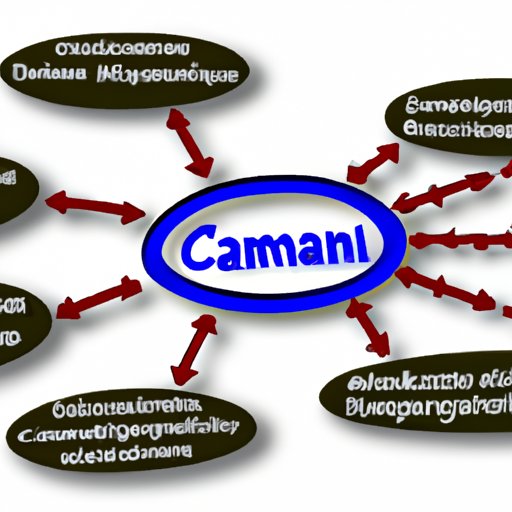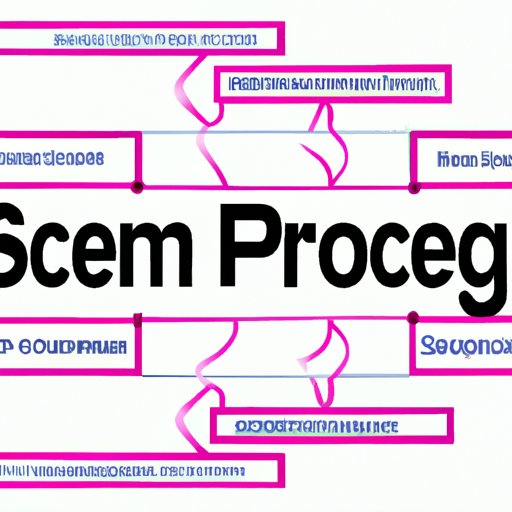Introduction
Supply chain management is an important business process that involves the coordination of activities across multiple entities. It encompasses the planning, organizing, and controlling of the flow of goods and services from the source to the customer. In today’s competitive markets, effective supply chain management is critical for a company’s success.

Definition of Supply Chain Management
According to the Global Supply Chain Forum, “Supply chain management (SCM) is the integration of key business processes from end user through original suppliers that provides products, services, and information that add value for customers and other stakeholders.” In other words, it is the network of activities, people, organizations, technologies, and resources involved in moving goods and services from the supplier to the consumer. The goal of supply chain management is to reduce costs, increase efficiency, and improve customer service.
Overview of Different Types of Supply Chain Management
There are several different types of supply chain management, including: procurement, production, distribution, and inventory management. Procurement involves purchasing materials and services from suppliers. Production involves the transformation of raw materials into finished products. Distribution involves the transportation and storage of products. Finally, inventory management involves tracking and managing inventory levels.

Benefits and Challenges of Supply Chain Management
The successful implementation of supply chain management can bring many benefits to a company, such as improved customer satisfaction, cost savings, better inventory control, and increased efficiency. However, there are also some challenges associated with supply chain management, such as dealing with complex networks, managing multiple stakeholders, and ensuring the accuracy of data.
Technology and Supply Chain Management
Technology plays an important role in supply chain management. Technology helps companies automate processes, track shipments, and manage inventory more effectively. According to a study by McKinsey, “By 2025, technology-enabled supply chain transformations could create up to $1.5 trillion in new value globally.”
Examples of How Technology is Used in Supply Chain Management
One example of how technology can be used in supply chain management is through the use of radio frequency identification (RFID). RFID tags are placed on products and allow companies to track their location in real time. This helps companies monitor inventory levels, reduce losses, and increase operational efficiency. Another example of how technology is used in supply chain management is through the use of blockchain technology. Blockchain technology can be used to securely store and share data, which helps to reduce errors and improve the accuracy of data.

Role of Logistics in Supply Chain Management
Logistics is an integral part of supply chain management. Logistics involves the planning, implementation, and control of the efficient flow of goods and services from the point of origin to the point of consumption. Logistics is responsible for ensuring that products are delivered on time and in the right quantities. Without proper logistics management, a company’s supply chain operations can suffer.
Definition of Logistics
According to the Council of Supply Chain Management Professionals, “Logistics is the process of planning, implementing, and controlling the efficient, cost-effective flow of goods, services and related information from point of origin to point of consumption for the purpose of conforming to customer requirements.” In other words, it is the process of planning and managing the movement of goods and services from the supplier to the customer.
Functions of Logistics in Supply Chain Management
Logistics plays an important role in supply chain management. It is responsible for coordinating the flow of goods and services from the supplier to the customer. It is also responsible for ensuring that products are delivered on time and in the right quantities. Additionally, logistics can help to reduce costs by optimizing routes and streamlining processes.
Traditional and Modern Supply Chain Management Strategies
Supply chain management has evolved over the years and now includes both traditional and modern strategies. Traditional supply chain management strategies focus on cost reduction and operational efficiency. Modern supply chain management strategies emphasize customer satisfaction, collaboration, and the use of technology.

Comparison of Traditional and Modern Supply Chain Management Strategies
Traditional supply chain management strategies focus on cost reduction and operational efficiency, while modern supply chain management strategies emphasize customer satisfaction, collaboration, and the use of technology. Traditional supply chain management strategies tend to be more rigid and less flexible, while modern strategies are more agile and adaptive. Traditional strategies focus on short-term gains, while modern strategies focus on long-term sustainability.
Advantages and Disadvantages of Each Strategy
The advantages of traditional supply chain management strategies include cost savings and operational efficiency. The disadvantages include a lack of flexibility and a lack of customer focus. The advantages of modern supply chain management strategies include increased customer satisfaction, increased collaboration, and the use of technology. The disadvantages include higher costs and the need for more sophisticated technology.
Conclusion
In conclusion, supply chain management is an important business process that involves the coordination of activities across multiple entities. It encompasses the planning, organizing, and controlling of the flow of goods and services from the source to the customer. Technology and logistics play an important role in supply chain management, and there are both traditional and modern strategies that can be used. By understanding the benefits and challenges of supply chain management, companies can use the right strategies to increase efficiency, reduce costs, and improve customer satisfaction.
This article explored the concept of supply chain management, its benefits and challenges, the role of technology and logistics in supply chain management, and the comparison between traditional and modern supply chain management strategies. Companies should consider the advantages and disadvantages of each strategy before making a decision on which to implement in order to achieve the best results.
Call to Action
If you want to learn more about supply chain management and how to optimize your supply chain operations, contact us today! We will work with you to develop a customized solution that meets your business needs.
(Note: Is this article not meeting your expectations? Do you have knowledge or insights to share? Unlock new opportunities and expand your reach by joining our authors team. Click Registration to join us and share your expertise with our readers.)
